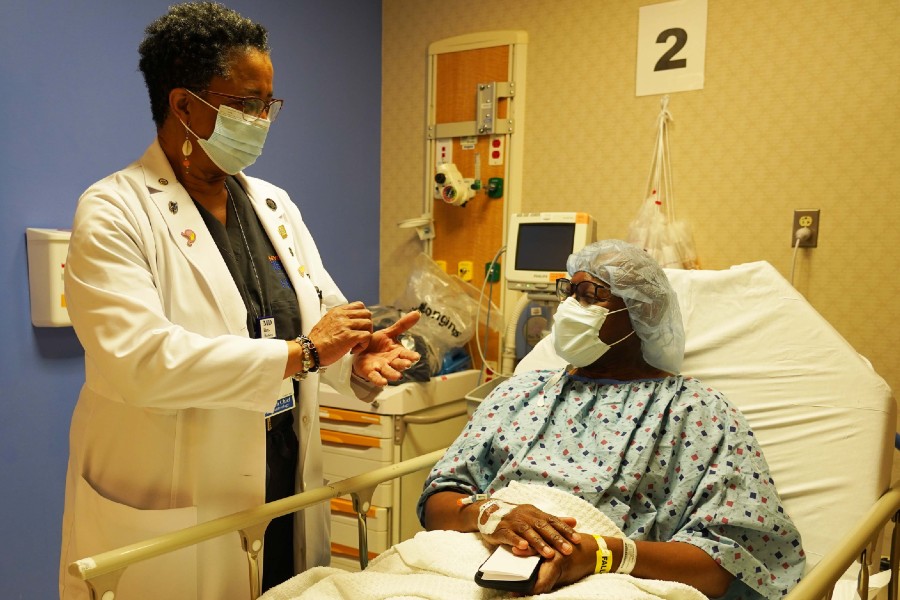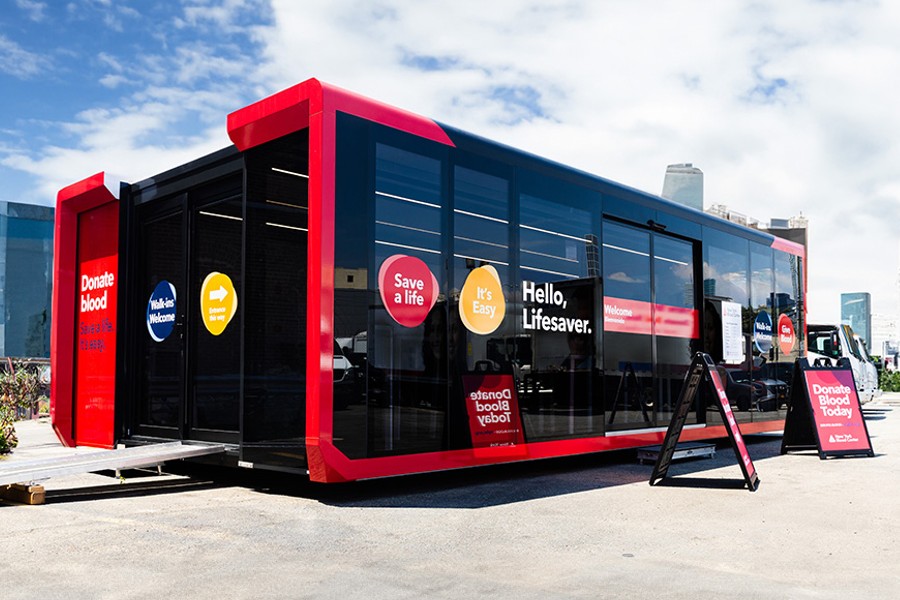
NYC Health + Hospitals/Harlem CEO Georges Leconte and Chief of Gastroenterology Joan Culpepper-Morgan, MD with a Scopy Award.
The award came from the American College of Gastroenterology for a video produced last year where Mr. Leconte allowed cameras to follow him as he prepped and underwent a routine colonoscopy.
The video was meant to encourage more New Yorkers ages 45 to 75 to get screened for preventable cancer and to de-stigmatize the potentially life-saving procedure. Colorectal cancer, also known as colon cancer, occurs in the colon or rectum and is the second-leading cause of cancer death in New York City.
African Americans are about 20 percent more likely to get colon cancer and about 40 percent more likely to die from it than most other groups, according to the American Cancer Society. The NYC Health + Hospitals system offers colonoscopies and the at-home fecal immunochemical (FIT) test, which is easy and less invasive, to help prevent colon cancer or find it early when it is more treatable. To make an appointment, call 1-1-844 NYC-4NYC. View Mr. Leconte’s video here, and learn more here about the FIT test from NYC Health + Hospitals Vice President and Chief Population Health Officer Dr. Nichola Davis.
In the video Dr. Culpepper-Morgan performed a live, routine colonoscopy for Mr. Georges Leconte to demonstrate the ease and safety of the procedure with hopes of dispelling stigma and reducing fear among patients. The video follows the journey of the patient, Mr. Leconte, beginning with a pre-op appointment where the patient engages in a discussion with Dr. Culpepper-Morgan regarding family medical history, expectations for the procedure and some concerns.
The next segment of the video shows how the patient prepares one day prior to the colonoscopy by adhering to a diet of light fare consisting of low-fiber food and clear liquids, followed by a prescription laxative. The final scene is the day of the procedure where viewers witness the full colonoscopy process beginning with the patient’s arrival, anesthesia, procedure and post-op.
“Colorectal cancer is the third leading cause of cancer-related deaths amongst both men and women in the United States, emphasizes the importance of colorectal cancer outreach and prevention in local communities. Consistent and intentional outreach coupled with comprehensive literature will encourage patients to schedule timely colorectal screening,” said NYC Health + Hospitals/Harlem CEO Georges Leconte, MPA, FAB, RRT.
“With recent changes to the American Cancer Society’s age recommendation for colorectal cancer screening, it is imperative that outreach and prevention efforts are constantly in motion to support the health and wellness of underserved communities. Age 45 is the new 50 when planning for colonoscopy procedures. We want to save more lives and get ahead of potentially life-threatening illness,” said NYC Health + Hospitals/Harlem Chief of Gastroenterology Dr. Joan Culpepper-Morgan.
“According to the American Cancer Society, African Americans are 20% more likely to get colorectal cancer and 40% more likely to succumb to the illness. The Community Advisory Board applauds Mr. Leconte and Dr. Culpepper-Morgan for their outreach prevention efforts to increase awareness and timely colon screening for residents in the Harlem community,” said NYC Health + Hospitals/Harlem Community Advisory Board Chair Karen Dixon.
“… Harlem Hospital is saving lives and improving overall health outcomes.”
“Congratulations to Harlem Hospital on their commitment to providing quality healthcare to the community. Colorectal screening is a crucial step in prioritizing the health of the black community. By raising awareness and promoting regular screenings, Harlem Hospital is saving lives and improving overall health outcomes. We appreciate their dedication to addressing the unique health needs of Black men and look forward to continued progress in improving health outcomes,” said One Hundred Black Men New York Health and Wellness Committee Co-Chair Dr. Maurice Franklin.
Regular screenings can find colon cancer early, when it is easier to treat. When colon cancer is detected at an early stage, the 5-year relative survival rate is about 90 percent; however, only 4 out of 10 colon cancers are found this early. That is why it is so important to get screened!
“… colon cancer does not show signs or symptoms until it grows or spreads …”
Often, colon cancer does not show signs or symptoms until it grows or spreads, which is why it is important to screen for it regularly. Symptoms of colon cancer can include blood in the stool or rectum, sudden weight loss, and diarrhea or constipation that doesn’t go away. New Yorkers should talk to their doctor if they experience any of these symptoms.
New Yorkers are more likely to get colorectal cancer if they:
- Are older (the older you get, the higher your risk)
- Have a personal history of colon cancer or polyps
- Have a family history of colon cancer
- Have certain inherited risks, such as familial adenomatous polyposis or Lynch syndrome
- Have inflammatory bowel disease, like ulcerative colitis or Crohn’s disease
- Do not exercise regularly
- Have obesity
- Drink alcohol
- Smoke
To lower your risk of colon cancer:
- Maintain a healthy weight
- Eat fewer processed meats, such as hot dogs and deli meats
- If you smoke, make a plan to quit
- Exercise regularly
- Reduce the amount and how often you drink alcohol
NYC Health + Hospitals/Harlem
NYC Health + Hospitals/Harlem is a 303-bed hospital that provides a broad array of preventive, primary and acute care services including general medicine and medical subspecialties, general surgery and surgical subspecialties, infectious diseases, obstetrics and gynecology, pediatrics and neonatology, critical care, imaging, radiology and nuclear medicine, rehabilitation medicine, psychiatry and substance abuse services, dental and oral surgery, physical, speech and occupational therapies. They are an Area-Wide Burn Center and Level II Trauma, with Centers of Excellence for Bariatric Surgery, Breast Imaging and Sexual Assault Forensics, a designated Stroke and AIDS Center, a World Health Organization’s UNICEF Designated Baby Friendly. For more information, visit https://www.nychealthandhospitals.org/locations/harlem/
NYC Health + Hospitals
NYC Health + Hospitals is the largest municipal health care system in the nation serving more than a million New Yorkers annually in more than 70 patient care locations across the city’s five boroughs. A robust network of outpatient, neighborhood-based primary and specialty care centers anchors care coordination with the system’s trauma centers, nursing homes, post-acute care centers, home care agency, and MetroPlus health plan—all supported by 11 essential hospitals. Its diverse workforce of more than 43,000 employees is uniquely focused on empowering New Yorkers, without exception, to live the healthiest life possible. For more information, visit www.nychealthandhospitals.org
- Wells Fargo Shares Economic Impact From Open For Business Fund
- Harlem Rallies For Kamala Harris: A Historic Gathering Of Black Women Leaders
- In Conversation With Ketanji Brown Jackson At The Apollo Theater In Harlem
- Chancellor David C. Banks Appoints Simone Hawkins As Deputy Chancellor For Early Education
- Vibrant Summer Styles Are Making A Comeback 2024
Become a Harlem Insider!
By submitting this form, you are consenting to receive marketing emails from: Harlem World Magazine, 2521 1/2 west 42nd street, Los Angeles, CA, 90008, https://www.harlemworldmagazine.com. You can revoke your consent to receive emails at any time by using the SafeUnsubscribe® link, found at the bottom of every email. Emails are serviced by Constant Contact









